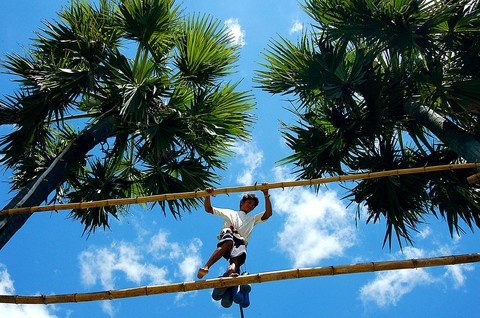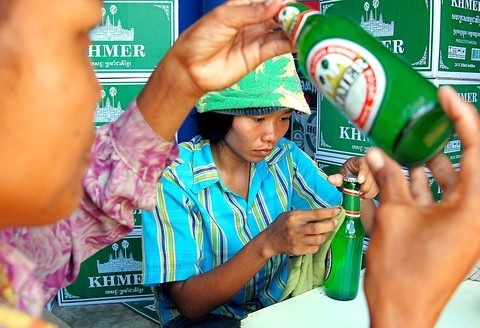In a hut built from the leaves of Cambodia's famed sugar-palm tree, a worker sloshes suds into used glass bottles, readying them to be filled with a unique local brew made from the bountiful tree: sugar palm beer.
The labels of international beer brands are scrubbed off bottles by some of the 20 staff here and replaced with stickers bearing the name "Khmer" featuring an image of Angkor Wat and two spiky sugar palms, Cambodia's national tree.
"We are nationalists who love the palm tree ... and this is a tree that can help reduce poverty," Pok Leakreasey says enthusiastically, referring to the 35 members of the local Club of Palm-Tree Lovers who set up the enterprise he directs.

PHOTO: AFP
The cider-like concoction, made from the tree's sap, has a sweet yet mouth-puckeringly tangy flavor. Distribution around the country is widening.
The brew is the brainchild of the club, whose members fear that the tree dotted across the emerald rice paddies of the kingdom, one of the world's poorest countries, is under threat.
Extra cash

PHOTO: AFP
With more than a third of Cambodians earning less than a dollar a day, the US$5 they are paid to sell the wood of a single sugar palm tree to businessmen is an easy way to earn extra cash. Though there are no official figures, reports say clusters of trees have been cut down in the provinces of Kandal, where Daun Mann is located, and neighboring Kampong Speu.
Traditionally, villagers used the sap tapped from the stems where the tree's fruit and flowers grow to make distinctively-flavored palm sugar, an essential addition to spicy curries and other Cambodian specialties. But increased competition from white cane sugar imported from neighboring Thailand, along with the spiralling cost of the firewood needed to help produce the palm sugar, means the trees have lost their luster.
So in 1999, the club successfully persuaded villagers at Daun Mann, a settlement about 30km west of Phnom Penh still studded with sugar palms, to use the sap to make vinegar. Then last year they hit on the tastier idea of using lightly fermented sour palm juice made from the sap, a popular elixir in rural Cambodia, into a carbonated "beer" with an alcohol content of 4.5 percent.
The result was a drink that Pok, 35, is confident has wide appeal.
"Consumer feedback is that the beverage is good and easy to drink," he says.
The factory churns out about 2,400 bottles per day, which are distributed to the capital Phnom Penh, Siem Reap -- the gateway town to the Angkor Wat temple complex -- and Battambang and Kampong Chhnang provinces.
Daun Mann villagers are paid 150 riel (four US cents) per liter of sap, selling up to 2,000 liters per day in total.
Uoch Vorn, 60, who has climbed the slender trees since he was 15, attaching bamboo containers to the stems to collect the sap overnight, is thrilled with the new market, which means he can earn about US$6 per day.
Selling sap
"Selling the sap is easier than making it into sugar. I can sell 150 liters a day doing this," he says, with the knife he uses to slash 25 trees twice a day tucked against his leg.
The drink was at first christened "Naga," but Pok says drinkers suggested the name "Khmer" -- the name of indigenous Cambodian people -- instead, believing they should capitalize on its roots.
"When people hear the words `tom yam' they know they are talking about Thai food," he says, referring to the spicy soup its neighbor is world-renowned for. "We wanted to do a similar thing, because palm trees represent Cambodia."
Kim Sea, who distributes the beer in Siem Reap, says he has already sold Khmer to more than 200 outlets, inclu-ding restaurants and supermarkets, and claims the new brand has been a hit among both tourists and Cambodians.
But he has received some complaints of upset stomachs from the beer, which sells at 1,500 riel (40 US cents) a bottle.
"Some consumers are concerned about the sanitation of the beer production and think it is not good enough," he says, adding that he has passed on the comments to the factory.
He is also encouraging tour guides to tell tourists about the drink, "but they dare not introduce it to them because they are afraid drinking it will cause them problems," he says, sighing.
It's a reflection perhaps of an ingrained wariness even among Cambodians themselves of products made in the kingdom, where there is virtually no industrial base. The beer has quality approval from the ministry of industry.
Pok, meanwhile, is aiming to double production next year when he expands advertising from local radio to national television. He aims to export Khmer, with companies from both Japan and the US taking samples back for study.
"But they have not ordered from us yet," he says, adding he remains hopeful of spreading the Khmer name worldwide.

April 28 to May 4 During the Japanese colonial era, a city’s “first” high school typically served Japanese students, while Taiwanese attended the “second” high school. Only in Taichung was this reversed. That’s because when Taichung First High School opened its doors on May 1, 1915 to serve Taiwanese students who were previously barred from secondary education, it was the only high school in town. Former principal Hideo Azukisawa threatened to quit when the government in 1922 attempted to transfer the “first” designation to a new local high school for Japanese students, leading to this unusual situation. Prior to the Taichung First

The Ministry of Education last month proposed a nationwide ban on mobile devices in schools, aiming to curb concerns over student phone addiction. Under the revised regulation, which will take effect in August, teachers and schools will be required to collect mobile devices — including phones, laptops and wearables devices — for safekeeping during school hours, unless they are being used for educational purposes. For Chang Fong-ching (張鳳琴), the ban will have a positive impact. “It’s a good move,” says the professor in the department of

On April 17, Chinese Nationalist Party (KMT) Chairman Eric Chu (朱立倫) launched a bold campaign to revive and revitalize the KMT base by calling for an impromptu rally at the Taipei prosecutor’s offices to protest recent arrests of KMT recall campaigners over allegations of forgery and fraud involving signatures of dead voters. The protest had no time to apply for permits and was illegal, but that played into the sense of opposition grievance at alleged weaponization of the judiciary by the Democratic Progressive Party (DPP) to “annihilate” the opposition parties. Blamed for faltering recall campaigns and faced with a KMT chair

Article 2 of the Additional Articles of the Constitution of the Republic of China (中華民國憲法增修條文) stipulates that upon a vote of no confidence in the premier, the president can dissolve the legislature within 10 days. If the legislature is dissolved, a new legislative election must be held within 60 days, and the legislators’ terms will then be reckoned from that election. Two weeks ago Taipei Mayor Chiang Wan-an (蔣萬安) of the Chinese Nationalist Party (KMT) proposed that the legislature hold a vote of no confidence in the premier and dare the president to dissolve the legislature. The legislature is currently controlled